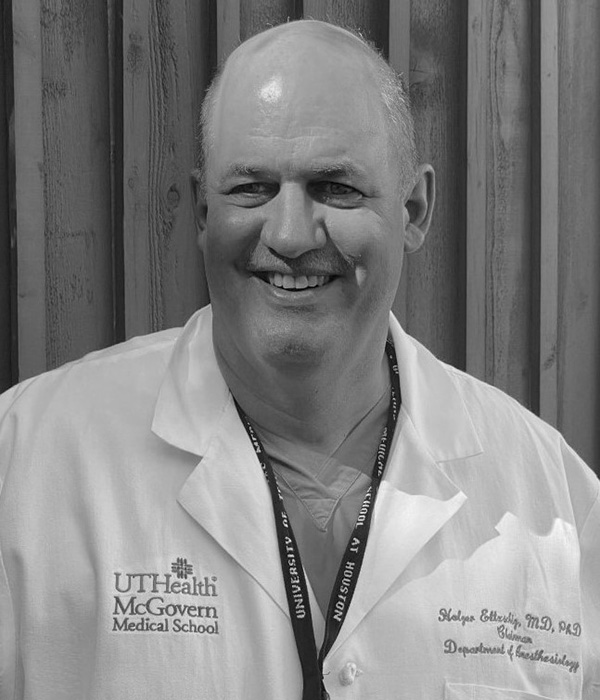Holger Eltzschig, MD, PhD

Professor and Chair, Department of Anesthesiology
John P. and Kathrine G. McGovern Distinguished University Chair
Associate Vice President for Translational Research and Perioperative Programs
It has definitely been a year that was different from anything I’ve experienced before. As a department, on many levels, we came out stronger than before. The pandemic was an event that united people. We rolled up our sleeves; we did what we had to do.
I was impressed how my faculty handled the clinical requirements. We were on the forefront of doing health care with COVID patients – we went through the hospital and through the operating rooms having to intubate patients who were suffering from COVID. My faculty all did well – we didn’t have any losses in our faculty or residents or advanced practice providers. But it was challenging and scary to intubate patients who were testing positive with COVID. It was challenging to do anesthetics on these patients because we didn’t know at the beginning how long we would have PPEs and the safety level of what we were doing. Were we potentially bringing the disease home to our families? So being a chair of a department of frontline providers for patients of COVID was definitely a challenging time, but we came together in some ways stronger than before, and I’m very proud of my clinical faculty.
“COVID put our research and ideas on the front page from a question, ‘Is ARDS still a problem?’ to now everyone agrees, yes, it is something we need to address.”
I have to say the same goes for my researchers. Many of our researchers started to get highly involved in research related to COVID. They got PPE, they got vaccinated, and they’re not scared of doing research with the virus and with infectious SARS-COV-2 models for us to learn about the virus and understand new ways of how to deal with it.
From a personal perspective, it had some impact on my family of course. My children schooled from home this year, we have a 10- and 11-year-old and they are best friends with each other, so their social life was not dramatically impacted. The biggest impact on
my personal life was that I could not see my parents, who live in Germany. I try to visit my parents once or twice a year, and I haven’t seen them now in 18 months – hopefully I will be able to see them this summer.
For me as a scientist, COVID actually had a very positive effect. My research has been focused on studying organ injury. Probably the most impactful research we have done in this regard has been on acute respiratory distress syndrome (ARDS). ARDS transformed with COVID-19. Patients who have SARS-COV-2 pneumonia can develop ARDS – their lungs become leaky, they fill up with fluid, and if things go bad – there have been 500,000 deaths in the United States from COVID, and most of those patients died from ARDS. Suddenly the research we’d been doing went to a different level of significance and impact. In March, when COVID was starting, Dr. Ben Bobrow and I started to think COVID could represent an opportunity to take our prior lab findings to patients. We now have $5 million in Department of Defense funding, NIH support, and have launched a large-scale randomized trial to see if Vadadustat, a drug that activates hypoxia-inducible transcription factor, which is stabilized during ARDS and something we started studying 10 years ago, can prevent or treat ARDS in COVID patients.
By some degree I have to say I was just very lucky to be a physician- scientist who has been interested in studying ARDS with some ideas and findings. COVID put our research and ideas on the front page from a question, ‘Is ARDS still a problem?’ to now everyone agrees, yes, it is something we need to address. It is unheard of, that we could go from an idea to 200 patients in a clinical trial in just a year’s time. This would have never happened without the pandemic.
